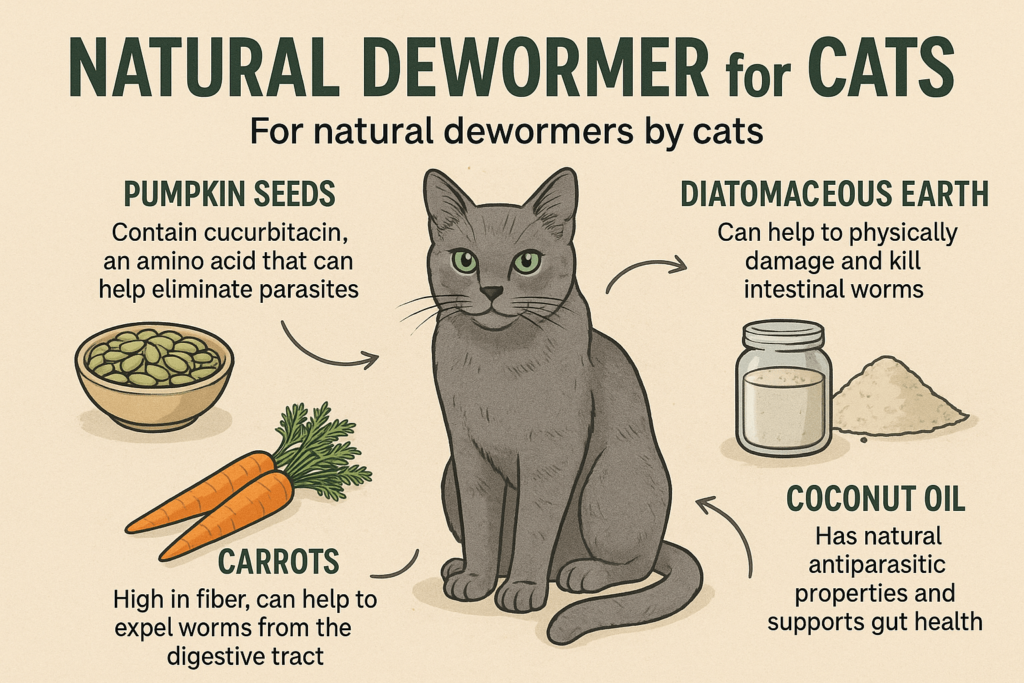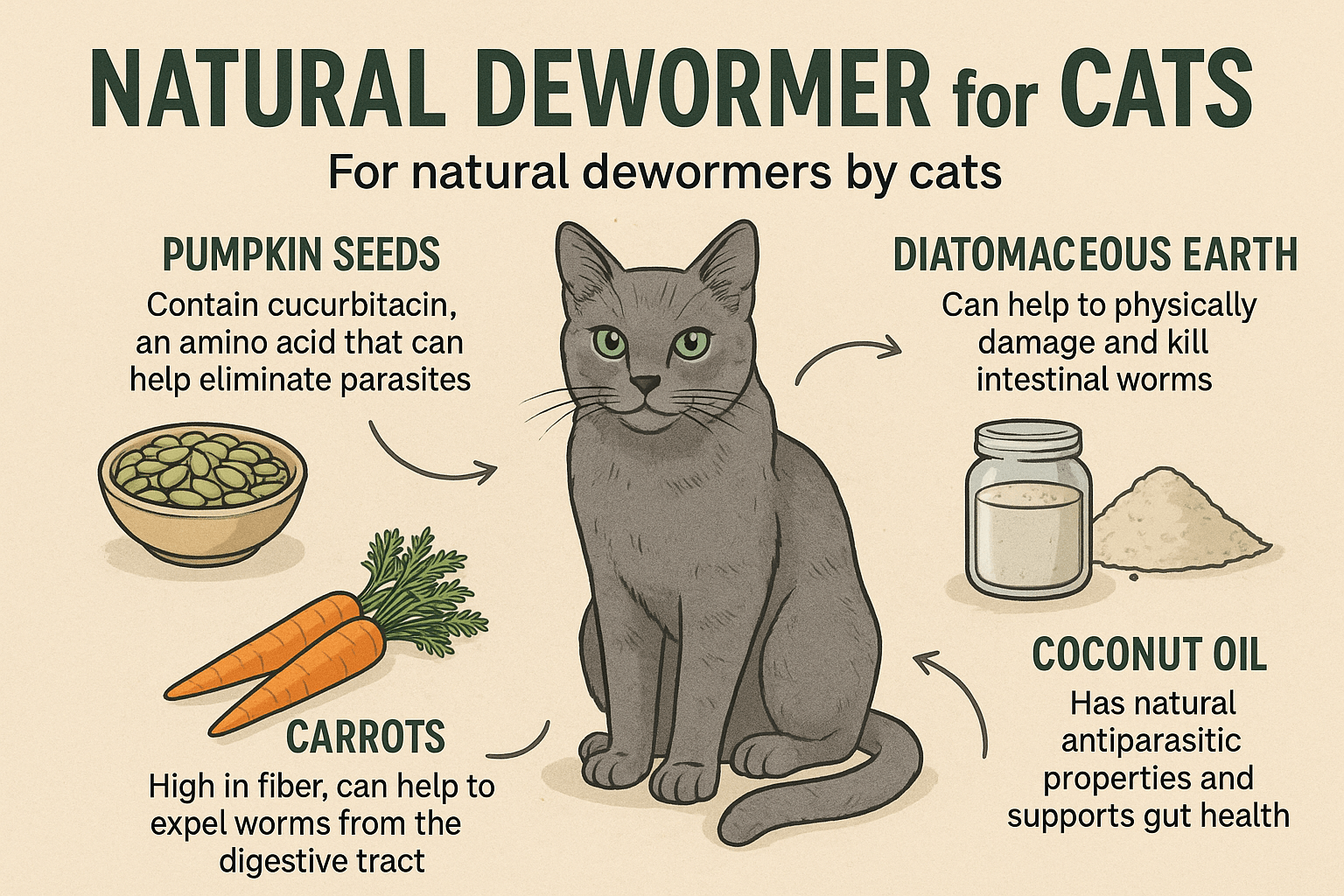Natural Dewormer for Cats: A Safe and Effective Approach
Worm infestations are a common concern for cat owners, but treating them doesn’t always require harsh chemicals or prescription medications. Many pet parents are turning to natural dewormers as a gentler alternative to keep their feline friends healthy and parasite-free. From dietary changes to herbal remedies, there are numerous ways to address worms naturally while supporting your cat’s overall well-being. In this blog post, we’ll explore the best natural deworming options, how they work, and tips for preventing future infestations. Let’s dive into the world of holistic care for your beloved pet!
Expert Opinion: The Risks of Using Garlic as a Dewormer
“Garlic is a commonly recommended natural dewormer. Some small studies have looked into its use as a dewormer. They did demonstrate a reduction in worm egg production, but no evidence that garlic kills adult worms. In addition, garlic is toxic to cats and so it is unsafe to use as a natural dewormer and should be avoided.”
Top Natural Remedies to Deworm Your Cat
If you’re considering natural deworming solutions, it’s important to choose safe and effective options that align with your cat’s health needs. These remedies have been used for years and are backed by anecdotal evidence and traditional practices.
Pumpkin Seeds:
Pumpkin seeds contain cucurbitacin, a compound that paralyzes worms and helps expel them from the digestive tract. Grind the seeds into a fine powder and mix them with your cat’s food.Coconut Oil:
The medium-chain fatty acids in coconut oil create an inhospitable environment for parasites. Add a small amount (1/4 teaspoon) to your cat’s meals daily.Diatomaceous Earth (Food Grade):
This natural powder dehydrates worms internally, killing them without harming your cat. Sprinkle a tiny amount over wet food once a day.Parsley:
Parsley acts as a natural detoxifier and aids digestion, helping flush out parasites. Chop fresh parsley finely and mix it sparingly into your cat’s diet.Fennel Seeds:
Known for their antiparasitic properties, fennel seeds can help eliminate worms. Crush the seeds and sprinkle a small amount onto your cat’s food.
These natural remedies offer a gentle yet effective way to combat worms while promoting your cat’s overall digestive health.

Signs Your Cat May Have Worms
Recognizing the symptoms of a worm infestation is crucial for timely intervention. Early detection ensures your cat receives the care they need before the issue worsens.
Visible Worms in Stool or Vomit:
Roundworms, tapeworms, or other parasites may appear in your cat’s feces or vomit, often resembling grains of rice or spaghetti.Weight Loss Despite Normal Appetite:
Worms consume nutrients from your cat’s food, leading to unexplained weight loss even if they’re eating regularly.Diarrhea or Bloody Stool:
Intestinal parasites can irritate the digestive tract, causing diarrhea or stools streaked with blood.Excessive Licking or Biting at the Rear End:
Cats with worms often feel discomfort around their anal area, prompting excessive licking or biting.Bloated Abdomen:
Kittens and smaller cats may develop a pot-bellied appearance due to a buildup of worms in the intestines.
Identifying these signs early allows you to take action promptly, whether through natural remedies or veterinary care.
Check this guide 👉How Often Should You Deworm a Cat? Best 7 Tips!
Check this guide 👉Roundworm Treatment for Cats: Best 7 Expert Tips!
Check this guide 👉Cat Worms Identify: Best 7 Health Tips!
Natural Deworming Options | How They Work |
|---|---|
Pumpkin Seeds | Paralyze worms and aid in their expulsion |
Coconut Oil | Disrupts parasite survival in the gut |
Diatomaceous Earth | Dehydrates and kills worms internally |
Parsley | Detoxifies the digestive system |
Fennel Seeds | Exhibits antiparasitic properties |
Preventing Worm Infestations Naturally
Prevention is key to keeping your cat free from worms. By incorporating these natural strategies into your routine, you can minimize the risk of reinfestation.
Regular Flea Control:
Fleas are carriers of tapeworm eggs. Using natural flea repellents like neem oil or essential oils (diluted) can reduce the risk of transmission.Clean Feeding Areas:
Ensure your cat’s food and water bowls are cleaned daily to prevent contamination from external sources.Avoid Raw Meat Diets:
Raw meat can harbor parasites. Opt for cooked or high-quality commercial foods instead.Outdoor Supervision:
Monitor outdoor activities closely to prevent your cat from hunting rodents or birds, which can carry worms.Routine Check-Ups:
Schedule regular vet visits to monitor your cat’s health and catch any potential issues early.
By adopting these preventive measures, you can protect your cat from future worm infestations and maintain their long-term well-being.
When to Consult a Veterinarian
While natural remedies can be highly effective, there are situations where professional veterinary care is necessary. Knowing when to seek help ensures your cat stays safe and healthy.
Severe Symptoms:
If your cat exhibits extreme lethargy, vomiting, or bloody stool, immediate veterinary attention is required.Persistent Infestations:
If natural treatments fail to resolve the issue after several weeks, consult your vet for stronger alternatives.Kittens or Senior Cats:
Young kittens and older cats are more vulnerable to complications from worms and should always be evaluated by a vet.Underlying Health Conditions:
Cats with pre-existing conditions like diabetes or immune disorders may need specialized care.Uncertainty About Diagnosis:
If you’re unsure whether your cat has worms or what type of parasite they’re dealing with, a vet can provide clarity through testing.
Seeking professional guidance when needed ensures your cat receives the best possible care during treatment.
Benefits of Natural Deworming
Switching to natural deworming methods provides numerous advantages for both your cat and the environment. Here’s why many pet owners are making the switch.
Fewer Side Effects:
Unlike chemical dewormers, natural options are less likely to cause adverse reactions like nausea or fatigue.Environmentally Friendly:
Natural remedies break down harmlessly, reducing environmental impact compared to synthetic chemicals.Supports Gut Health:
Ingredients like pumpkin seeds and coconut oil promote a balanced digestive system alongside deworming benefits.Cost-Effective Solutions:
Many natural dewormers are affordable and readily available in most households or grocery stores.Holistic Approach:
Natural remedies align with a broader focus on your cat’s overall health rather than targeting just one issue.
The benefits of natural deworming make it an appealing choice for conscientious pet owners.
Common Misconceptions About Natural Deworming
Despite its growing popularity, natural deworming is surrounded by myths that can lead to confusion. Clearing up these misconceptions helps you make informed choices.
Myth: Natural Means Instant Results:
Natural remedies often take time to show results, requiring patience and consistency.Myth: All Herbs Are Safe for Cats:
Some herbs, like garlic, can be toxic to cats. Always research before introducing new ingredients.Myth: Deworming Is Only Necessary Once:
Regular treatment and prevention are essential to keep worms at bay long-term.Myth: Prescription Medications Are Always Better:
While medications are effective, natural options can be equally powerful when used correctly.Myth: Outdoor Cats Are the Only Ones at Risk:
Indoor cats can also contract worms through contaminated food, water, or fleas brought indoors.
Understanding the truth behind these myths ensures you approach natural deworming responsibly.
Tips for Administering Natural Dewormers
Getting your cat to accept natural dewormers can sometimes be challenging. These tips will help you administer remedies effectively without stress.
Mix with Favorite Foods:
Combine powdered remedies with wet food or treats your cat loves to mask the taste.Use Pill Pockets:
Wrap crushed seeds or powders in pill pockets designed for pets to make ingestion easier.Gradual Introduction:
Start with small amounts to let your cat adjust to the new taste or texture gradually.Positive Reinforcement:
Reward your cat with praise or treats after consuming the remedy to build positive associations.Stay Calm and Confident:
Your cat picks up on your emotions—if you’re relaxed, they’re more likely to cooperate.
With these techniques, administering natural dewormers becomes a seamless part of your cat’s care routine.
Frequently Asked Questions About Natural Dewormers for Cats
Are natural dewormers safe for all cats?
Most natural remedies are safe, but consult your vet if your cat has allergies or underlying health issues.
How long does it take for natural dewormers to work?
Results vary, but most remedies show improvement within 1-2 weeks of consistent use.
Can I combine multiple natural dewormers?
Yes, combining remedies like pumpkin seeds and coconut oil can enhance effectiveness, but avoid overdoing it.
Is diatomaceous earth safe for cats?
Food-grade diatomaceous earth is safe when used sparingly, but avoid inhalation as it can irritate lungs.
What if my cat refuses to eat the remedy?
Mix the remedy with strong-smelling foods like tuna or chicken broth to encourage consumption.
Empowering Your Cat’s Health with Natural Care
Using natural dewormers for cats offers a holistic approach to parasite control that prioritizes safety and wellness. Whether you’re incorporating dietary changes, herbal supplements, or preventive strategies, these methods empower you to take charge of your cat’s health naturally. Remember, consistency and observation are key—monitor your cat’s condition closely and seek professional advice when necessary. By combining natural care with responsible pet ownership, you can ensure your feline companion enjoys a happy, worm-free life!
Do Cats Have Taste Buds? Best 7 Expert Tips! – Discover how cats experience flavors and why their taste is so unique.
Do Dogs Have Taste Buds? Best 7 Expert Tips! – Discover how dogs experience taste, their preferences, and what it means for their diet and health.
Can Cats Taste Sweet? Best 7 Expert Tips! – Discover why cats can’t taste sweetness, how it affects their diet, and tips to keep them healthy and happy.
Can Dogs Taste Sweet? Best 7 Expert Tips! – Discover how dogs perceive sweetness, which foods are safe, and tips to manage their sweet cravings responsibly.





